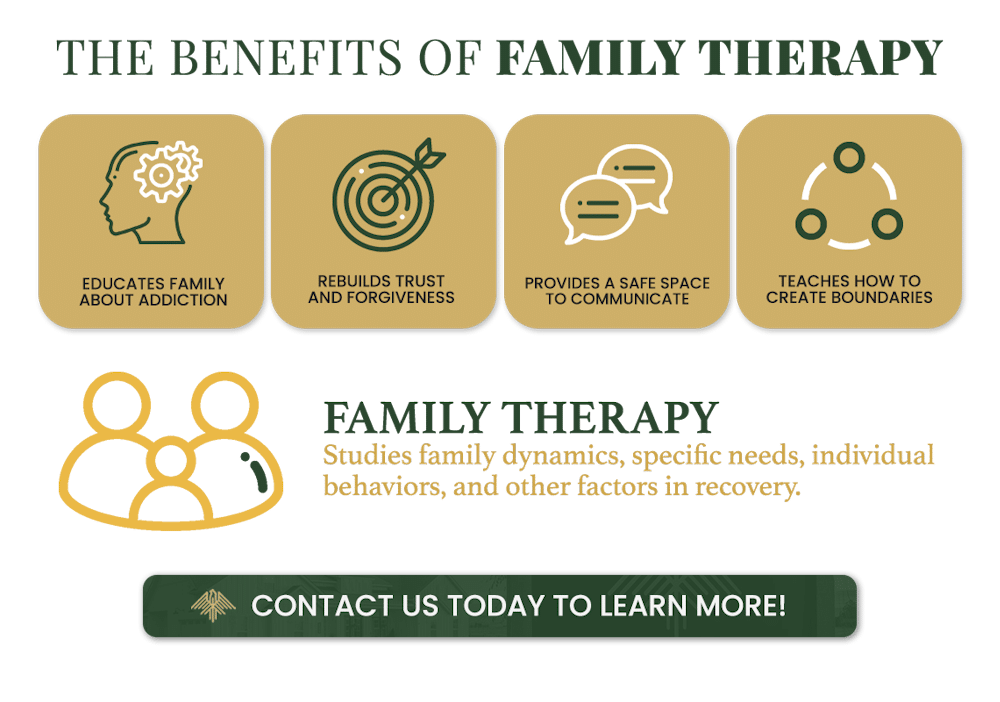Family Therapy for Addiction
According to the Substance Abuse and Mental Health Services Administration, family therapy is a necessary part of successful addiction treatment. One of the reasons why family therapy is important is because addiction affects those around the afflicted individual.
For example, consider the scenario of a young child who relies on a parent. If the parent develops an addiction and misses important events as a result, the child may feel angry. There may be a wide range of other emotions and effects. Family therapy for addiction is a good tool for helping families work through addiction, live happier and heal rifts.
At Eagle Creek Ranch Recovery in Nampa, Idaho, we utilize treatment resources such as family therapy for addiction to help break the vicious cycle.
Family therapy often involves the people who live with the person who struggles with addiction. Also, it involves other people who are important parts of the individual’s life. Trained therapists lead sessions and often use cognitive-behavioral therapy (CBT).
The approach focuses on beliefs and behaviors. Families learn more about their thoughts, responses to situations, and more. Therapists help them learn strategies to change problematic behaviors and manage emotions with dialectical behavior therapy (DBT). Families learn about addiction and how it works to help them better understand how to support a loved one. Additionally, family therapy helps people who struggle with addiction see how it affects those closest to them.
History of Family Therapy
As a formal therapy, family therapy started in 1942 with the formation of the American Association of Marriage Counselors.
It later became the American Association for Marriage and Family Therapy. Several notable clinicians in the United States and the United Kingdom contributed to the development and evolution of family therapy. Combining social psychiatry and social analysis, the earliest approach looked different than today’s family therapy.
In the 1950s, there was a shift toward focusing on communication within families. The evolution of the therapy continued and had multiple approaches throughout the 1950s and 1960s. There was also a greater focus on relationships in the 1960s. Behavior therapy for married couples was a focus in the 1970s. As the 1980s progressed, there was a greater shift toward redefining gender-related roles within the family. At the time, family units were changing. That continued in the 1990s.
Approaches changed to include dynamics of various cultures, religions, and other groups. Today, family therapy works to accomplish several important goals. As professionals started understanding addiction better, they started understanding more about how it impacts families. As a result, family therapy is now part of addiction treatment for many people. The top modern treatment facilities include this valuable therapeutic approach to improve outcomes for patients and their loved ones.
Contact Eagle Creek Ranch
Recovery Today!
Why Wait? Find The Help You Need By Reaching Out To Us Today! Our Admissions Team Is Standing By.
How Does Family Therapy Work?
Modern family therapy involves studying family dynamics and specific needs. Individual behavior, responses, and engagement in surrounding systems vary based on several factors. Therapists try to learn the broad context of those factors to better understand each person. As a result, the therapist can better understand relationships, communication, and issues within the family unit.
There are different processes and behaviors in families that can prevent beneficial changes. Therapists must determine what those hindrances are and how to try to remove them. In many cases, families do not realize certain hindrances lead to other problems. Also, they may not realize how family issues impact their relationships with peers, colleagues, and others outside the family unit. Therapists set goals with families based on important therapy guidelines. This applies to family therapy for addiction treatment in Idaho as well.
During detox, you’ll be closely monitored by our medical staff. We’ll make sure you’re as comfortable as possible and that you have everything you need. We’ll also help you through any withdrawal symptoms you may experience.
During the admissions process, we will conduct a full evaluation. This will help us to understand your particular detox needs and create a detox plan that’s right for you. Detoxing from drugs can be difficult and uncomfortable. However, our medical detox program is designed to make the process as smooth and safe as possible. Our experienced team of professionals will be monitoring you 24/7 to make sure you’re as comfortable as possible.
The Goals of Family Therapy for Addiction
There are unique challenges addiction presents for families. For example, the needs of a family going through a divorce are different than the needs of one trying to help an addicted loved one. However, there are many different potential family structures and needs. As a result, family therapy for addiction must take all those factors into account. With modern family therapy for addiction, there are several core principles SAMHSA recommends. These are the principles:
- Using a collaborative and non-blaming approach instead of a confrontational one.
- Understanding addiction complexities and helping families develop strategies to manage chronic mental health needs.
- Emphasizing the value of including all family members in the plan to fight addiction.
- Broadening the success measures for treatment to include the entire family’s well-being.
- Establishing harm-reducing goals that can benefit the family both physically and psychologically.
- Valuing the importance of using family therapy approaches to address cultural practices of families within their communities.
- Recognizing the importance of families’ other networks or communities as support and reinforcement sources.
In addition to using the above guidelines, therapists work with families to hear and consider their specific goals.
The Benefits of Family Therapy for Addiction
Working toward goals can have positive long-term outcomes. For instance, a valuable potential outcome of family therapy is preventing substance misuse from continuing to future generations. This may be possible when families understand their own needs and how to help one another. All the goals listed in the last section can lead to other possible beneficial outcomes. These are some top benefits of family therapy for addiction:
- Learning what addiction treatment is and knowing what to expect.
- Understanding addiction as a brain disease and how it influences behavior.
- Learning productive and valuable ways to communicate better.
- Knowing how to create boundaries and how to tell the difference between helping and enabling.
- Developing skills to protect individual mental well-being.
- Learning how to identify, correct, and prevent codependent behaviors.
- Rebuilding trust and learning how to forgive.
- Having a safe space to share feelings, concerns, and struggles.
- Creating an effective, nurturing support system for an addicted loved one.
- Understanding triggers and how to help a loved one prevent relapse.
- Learning self-assessment techniques to understand individual needs and family relationships.
Another benefit for some families is discovering unmet mental health needs. This may be true for the individual with an addiction or other family members. A co-occurring mental health disorder often causes a person to seek substances. For the loved one struggling with addiction, there is dual diagnosis treatment to address both needs.
However, some family members may also struggle with a mental health disorder. If that happens, family therapy may reveal that unmet need. In this way, it offers the opportunity to reveal a source of distress or pain. Also, discovering and treating an issue may prevent that family member from turning to substances.
Who Is a Candidate for Family Therapy?
When people hear this term, they often think of siblings and parents. Today, families are much more than immediate family members. Some people may not know their birth families or may live in blended families. Because structures vary so widely, SAMHSA recommends therapy for anyone close to an addicted individual. These are some examples of people who may be close to a loved one struggling with addiction:
- In-laws
- Chosen family members
- Stepchildren
- Stepparents
- Foster family members
- Extended family members
- Fellow veterans
- Sponsors
- Mentors
- Colleagues
What Happens If Family Members Will Not Participate in Therapy?
In some families, there may be strained relationships. Not everyone is willing to participate. Other family members and the person with the addiction should not take this personally. Family members who are unwilling to participate may be fearful of change, skeptical of therapy, or have other concerns. Therapists start with the family members who are willing to participate. Others may simply need time, and they can join when they are ready.
Finding the Right Family Therapist
Recent research supports the use of family therapy for addiction. In comparison with treatment that lacks family therapy, programs that include it is more effective. Because of the complexities of addiction, choose a family therapist who focuses on addiction or has experience with it. If a loved one is going through treatment at a facility, that facility may offer it.
Finding the right therapist can vary based on location, insurance, and more. For example, someone who has insurance may search a database of covered providers. A person who lives in a specific area may search for nearby therapists. Professional treatment facilities are the first place to look, and many facilities can answer questions about insurance.
Receive Family Therapy for Addiction at Eagle Creek Ranch Recovery
Family therapy for addiction is one of the services Eagle Creek Ranch Recovery in Nampa offers. We also provide individual therapy, dual diagnosis treatment, medical detox, outpatient treatment, and residential treatment. If you have a loved one who is struggling with addiction, we can help.
Our goal is to help people with addiction learn how to stay in recovery. Also, we want to help them strengthen family relationships and see the lives of family members improve. To learn more about addiction and family therapy, please contact us.
https://www.apa.org/pubs/videos/4310891
https://aamft.org/about_aamft/AAMFT.aspx
https://onlinelibrary.wiley.com/doi/pdf/10.1002/9781118269985.app4
https://psychology.org.au/for-members/publications/inpsych/2019/august/evolution-of-family-therapy
https://www.ncbi.nlm.nih.gov/books/NBK571088/
https://store.samhsa.gov/sites/default/files/d7/priv/sma13-4784.pdf

Clinical Director
Kendall Maloof is the clinical director at Eagle Creek Ranch Recovery. She is a licensed marriage and family therapist and has held multiple leadership roles before settling here at Eagle Creek. Kendall received her master’s degree in marriage and family therapy from the Chicago School of Professional Psychology in 2016. Her career in mental and behavioral health began in 2014 when she took up internships in both the nonprofit and for profit sectors. She interned at multiple reputable companies, such as The Living Success Center and 449 Recovery in California.
In 2019, Kendall became the clinical director of Sunsets Recovery for Woman, a dual diagnosis program in southern California. Kendall is a natural leader. She has an incredible ability to problem solve and stay calm in any situation. Kendall never fails to show up when she is needed, and her calm demeanor makes her team and clients feel at ease. Eagle Creek Ranch Recovery is proud to have Kendall as our clinical director.






